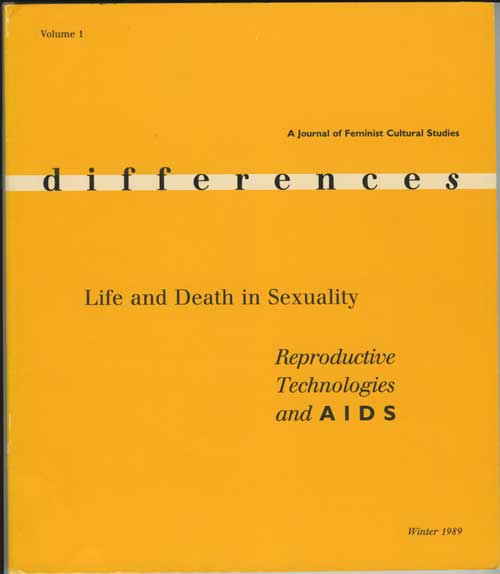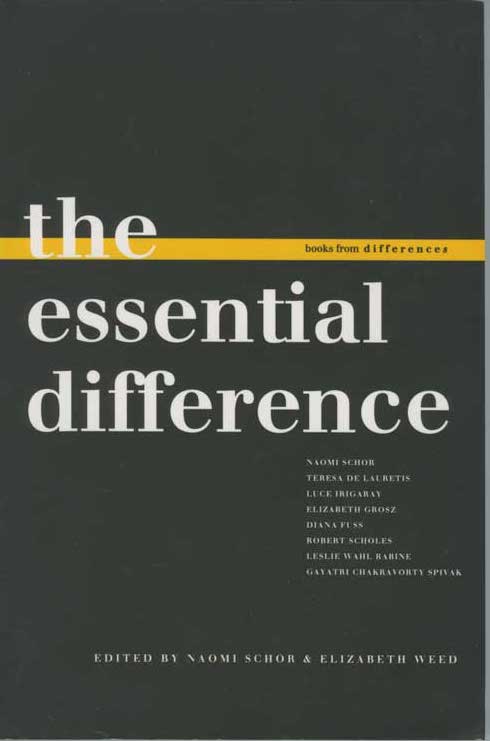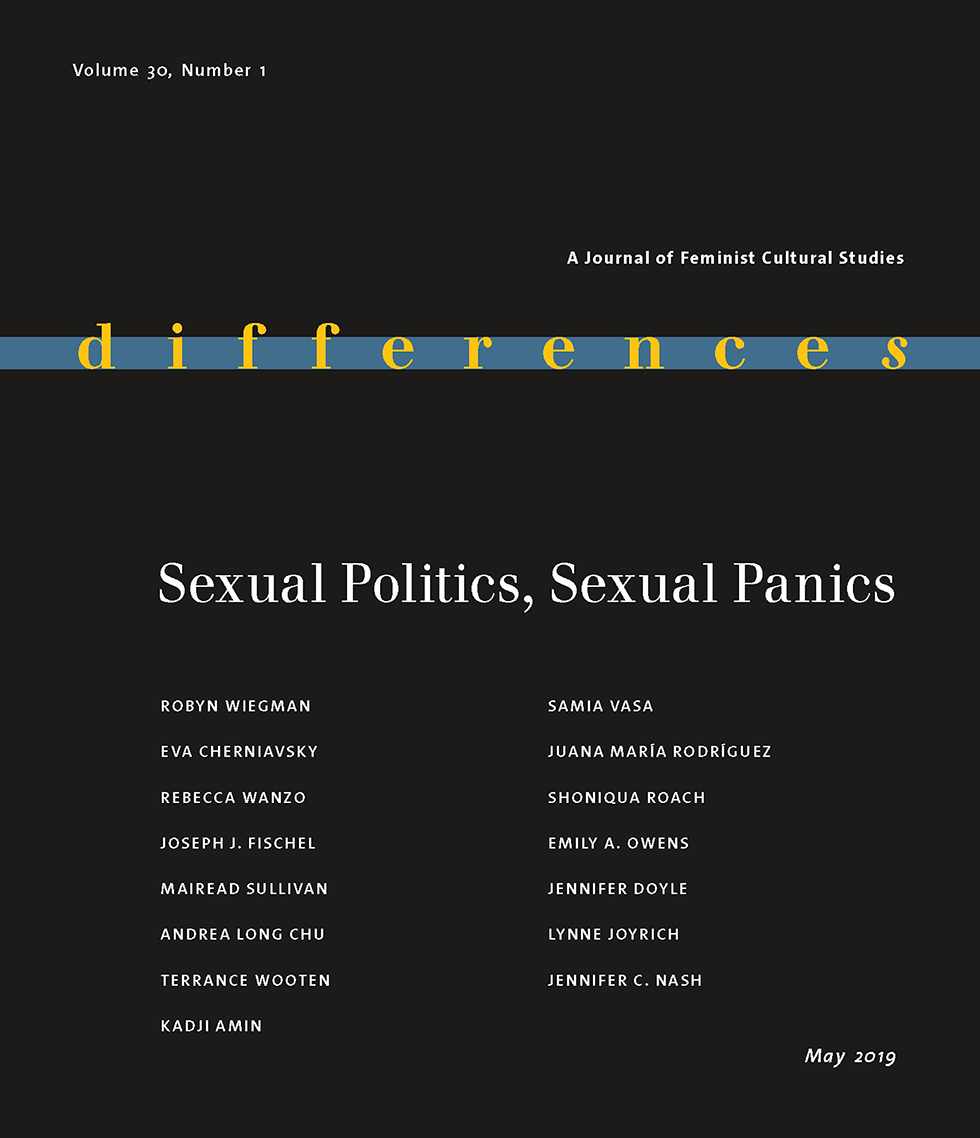 differences: A Journal of Feminist Cultural Studies, is supported by and located within the Pembroke Center and published by Duke University Press. The journal was co-founded in 1989 by Elizabeth Weed, then-associate director of the Pembroke Center and later director (2000-2010), and the late feminist theorist and scholar of French literature Naomi Schor. Between 1994 and 2008, differences published three books: The Essential Difference and Feminism Meets Queer Theory, edited by Schor and Weed and issued with Indiana University Press, and Women's Studies on the Edge, edited by Pembroke Center founding director Joan Wallach Scott and published by Duke University Press.
differences: A Journal of Feminist Cultural Studies, is supported by and located within the Pembroke Center and published by Duke University Press. The journal was co-founded in 1989 by Elizabeth Weed, then-associate director of the Pembroke Center and later director (2000-2010), and the late feminist theorist and scholar of French literature Naomi Schor. Between 1994 and 2008, differences published three books: The Essential Difference and Feminism Meets Queer Theory, edited by Schor and Weed and issued with Indiana University Press, and Women's Studies on the Edge, edited by Pembroke Center founding director Joan Wallach Scott and published by Duke University Press.
The journal is now edited by Elizabeth Weed, Ellen Rooney, the Royce Family Professor of Teaching Excellence and Professor of English and Modern Culture and Media at Brown, and Denise Davis, Senior Lecturer in Gender and Sexuality Studies and Director of the GNSS Graduate Certificate Program.
differences, which is accessible in print and digital formats, has been recognized for excellence by the Council of Editors of Learned Journals and enjoys a broad global readership.
In early 2020, to mark the journal’s three decades of critical work, we spoke with the editors about the journal’s founding and its current work.
Let's start with the name of the journal. Why “differences”?
At the time of the founding of the journal, European theories of difference, which challenged the universalizing and homogenizing tendencies of identity, coincided with strong US identity movements for civil rights and feminism. The name with the italicized s enacts this encounter—one that was fundamental to the debates of that time. And although the terms of th e debate have continually changed over the years, the underlying questions have not. The most basic questions at the core of feminist inquiry are where does difference begin or end? And where do differences begin or end? Those questions emerged early on in feminist debates regarding racialized differences and differences having to do with lesbianism versus heterosexuality. Today’s questions are more numerous and equally complex, but generations of feminist theorists have grappled with them. In doing so, they repeatedly demonstrated the crucial importance of feminist theory for both speculative and political thinking, two modes of critical work necessary for any kind of change. By insisting on the importance of the italicized s, the journal acknowledges how difficult it is to answer the questions that the s poses but how vitally important it is to do so.
e debate have continually changed over the years, the underlying questions have not. The most basic questions at the core of feminist inquiry are where does difference begin or end? And where do differences begin or end? Those questions emerged early on in feminist debates regarding racialized differences and differences having to do with lesbianism versus heterosexuality. Today’s questions are more numerous and equally complex, but generations of feminist theorists have grappled with them. In doing so, they repeatedly demonstrated the crucial importance of feminist theory for both speculative and political thinking, two modes of critical work necessary for any kind of change. By insisting on the importance of the italicized s, the journal acknowledges how difficult it is to answer the questions that the s poses but how vitally important it is to do so.
How do you choose the focus of each issue?
This varies. Sometimes, a prospective guest editor will approach the editors with a proposal for a special issue. This was the case with Black Marriage, edited by Ann duCille, and for Sexual Politics, Sexual Panics, edited by Robyn Wiegman. In other instances, a debate or current in mainstream discourse or academic circles prompts an issue, as was the case with Reading Remains, Transatlantic Gender Crossings, and Bad Object. It also happens that the editors will conceive of a special issue topic in conversation with other scholars, who will contribute to the table of contents as editors or as authors. Of course, differences also regularly publishes open issues that gather individual essays on a range of topics.
 The journal celebrated its 30th anniversary in 2019 and won an award for the way it took on the political stakes of contemporary sexual politics in the United States. Can you talk about how the journal stays nimble enough to respond to changing times and debates?
The journal celebrated its 30th anniversary in 2019 and won an award for the way it took on the political stakes of contemporary sexual politics in the United States. Can you talk about how the journal stays nimble enough to respond to changing times and debates?
The journal has always sought and promoted critical work that begins with questions rather than conclusions, that is not afraid to take a second or third look at a theory or a political position that seems to enjoy undisputed consensus. Of course, issues and concerns change with the times, but what doesn’t change is the continued need for people who are not afraid to challenge dogma and to think in unexpected ways. differences works to find those people, to publish their critical contributions, and to encourage exciting debate.